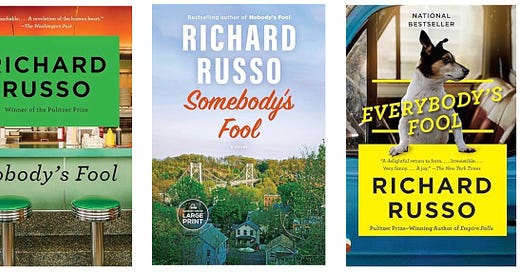BookLife Triple Review by Carol O'Day: Richard Russo’s North Bath Trilogy (Nobody’s Fool, Somebody’s Fool and Everybody’s Fool)
upstate New York, blue collar town, flawed hero, divorce, estranged father and son, grandpa, handyman, mature friendships, character-driven novel
Fans of Russo’s Pulitzer Prize-winning novel, Empire Falls, might disappear into this trilogy by Russo, and spend several hundred pages wallowing happily in the messy lives of the people of North Bath, a small town in upstate New York. North Bath is the forlorn and poor cousin of the adjacent and prosperous Schuyler Springs. Russo fills his North Bath trilogy of novels with loveable blue collar misfits, oddballs and frequent screw-ups. They are hard-working and financially wobbly people who work as handymen, construction workers, waitresses, used car salesmen, cops and junk yard curators. They are unlucky, not overly ambitious, not always entirely honest, but generally kind and good-hearted.
At the center of the stories is Sully, Donald Sullivan. Sully is a divorced, irregularly employed handyman/laborer, who lives in an spartan apartment, eats his meals at the local diner and bar, and may as well have his name inscribed on his barstool at the White Horse Tavern, commonly known as The Horse. Sully is long-divorced when we meet him and was largely uninvolved in raising his son, Peter. Sully has a stuttering, adoring best friend, Rub, who is intellectually challenged and unhappily married. Sully’s ex-wife Vera totters on the verge of insanity and ultimately does not win that battle. Sully has an on-again, off-again relationship with Ruth, a married woman and an ongoing flirtation with his sometimes boss’s wife, Toby. Sully’s most significant relationship may be with his widowed landlady, his former eighth grade English teacher, Mrs. Peoples. Sully’s adult son, Peter, returns to town and the two men slowly begin to reforge their relationship in spite of Peter’s significant resentment. Sully has an early run-in with young police officer Doug Raymer and Raymer returns in the third novel as a softer, matured, more likable character with a storyline of his own.
The reader cannot help but root for this cast of downtrodden characters. Russo brings them to life in a way that makes them seem very real in their flawed humanity. Their flaws make them relatable and fairly readily forgivable for their recurring missteps. Sully, though a loner, is a caretaker, and he performs a ballet of sorts, rotating between and amongst those he cares about dispensing small kindnesses. Each morning at Hattie’s diner, he lends a hand to the diner owner, Cass, by escorting her nearly blind elderly mom, Hattie, out from the women’s shared apartment at the back of the diner to the favored booth where she spends the day. He tolerates Hattie’s failed memory and willingly repeats the same conversation as his daily gift to Cass. He “loans” Rub money every day for his morning donut and lunchtime cheeseburger, and finds work for the two of them whenever money runs low. Sully checks in on his landlady each morning, shovels her walks and makes minor repairs she may need. He needles the bad guys and protects his lover’s daughter from her abusive husband. Sully acquires wisdom as he ages and we hope for the repair of his relationship with his estranged son.
Russo’s trilogy is a character-driven, multi-character three-act play, starring a winning ensemble of players. A fiction reader can settle in with these characters and become a part of their lives and their beleaguered town for a while. The reader rides along with them as they confront their fears, repeat bad habits, make amends and care for one another. Like a warm comforter, this trilogy is perfectly suited for the coming winter. Settle in on a comfy sofa or chair and feel just a bit reluctant to leave North Bath when you reach the final page of the third of three novels.




